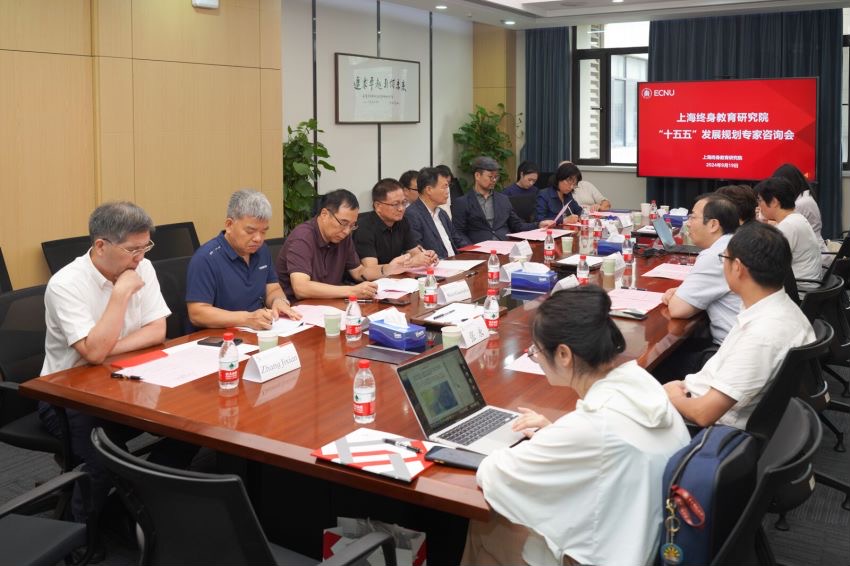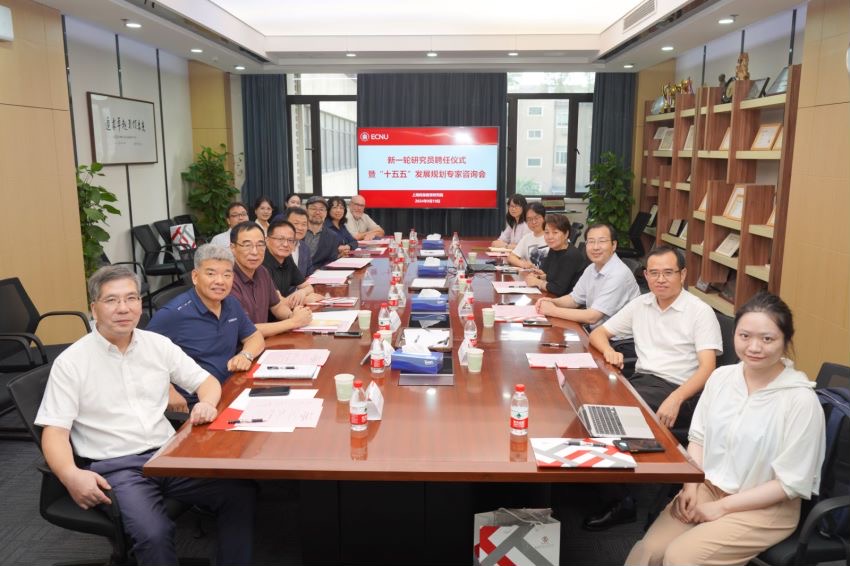East side of 7th Floor, No. 3663, North
Zhongshan Road, Shanghai, China, 200062
Tel: +86 21 6223 2322
www.smile.ecnu.edu.cn
On the afternoon of September 19, 2024, Shanghai Municipal Institute for Lifelong Education (SMILE) held theappointment ceremony of a new round of overseas researchers and expert consultation meeting for the 15th Five-Year Plan.
Attending the meeting were experts from many countries and regions, including Prof. Stuart McNaughton from the University of Auckland, New Zealand, Prof. Guofang Wan from Loyola University of Chicago, USA, Prof. Kang Dae Joong from Seoul National University, South Korea, and Prof. Yang Byung Chan from Kongju National University, South Korea. Domestic experts included Prof. Cui Xinyou, chairman of Lifelong Education Research Association, Jiangsu province, Prof. Shen Guanghui, vice president of Fujian Open University, Prof. Zhang Jixian, vice president of Zhejiang Open University, and Researcher Shi Feng, director of the Institute of Lifelong Learning and Education for Sustainable Development of Beijing Academy of Educational Sciences.
Prof. Chen Shuangye, executive deputy director of the Faculty of Education of East China Normal University(ECNU), was invited to attend the meeting and had an in-depth discussion and exchange with experts from home and abroad on the scientific research and innovation in the field of lifelong education, the building of anacademic community, and SMILE’s development planfor the 15th Five-Year Plan. The meeting was hosted by Prof. Li Jiacheng, executive vice president of SMILE, and attended by Ms. Zou Wen, director of the Administration Departmentof SMILE, Mr. Zhang Yong and Ms. Zhu Min, part-time researchersfromECNU.

Appointment Ceremony of the New Round of Overseas Researchers
At the beginning of the meeting, the appointment ceremony of the new round of overseas researchers was held, at which Prof. Chen Shuangye, executive deputy director of the Faculty of Education of ECNU, awarded the appointment certificates to the four representatives present of overseas researchers respectively.
Expert Consultation Meeting on the 15th Five-Year Plan
During the consultation meeting, the experts held in-depth discussions and exchanges on issues such as improving the management mechanism of the research platform of the institute, building an academic community for lifelong education, and promoting the development of lifelong education during the 15th Five-Year Plan.
Prof. Stuart McNaughton shared his experience of building an academic community at the Wool Fischer Research Center of the University of Auckland in New Zealand, together with his experience of visiting Qianjing Primary School of Jinshan District that morning, and emphasized the importance of expanding the practice of innovative education to more schools, so as to strengthen the integration and transformation of theories and practices, and focus on the effectiveness of research.
Prof. Wan Guofang from the United States discussed the potential impact of digital technology on intergenerational education and how social media can be used for positive interactions at home.
Prof. Kang Dae Joong and Prof. Yang Byung Chan from South Korea shared their experiences of several visits to SMILE and emphasized the importance of strengthening long-term cooperation in lifelong education research between China and South Korea.
Prof. Cui Xinyou, chairman of Lifelong Education Research Association, Jiangsu province, fully acclaimed SMILE’s leading role in national climate change education and intergenerational education in recent years, and its excellent experience in the institutional innovation of the National Lifelong Education Collaborative Alliance. He proposed to set up a joint community for lifelong education research in the Pan-Yangtze River Delta region, drawing the relative strength from Jiangsu, Zhejiang, Shanghai, Fujian and other developed coastal regions, to build a regional academic community for lifelong education that is innovative, open and sharing, so as to lead and push forward the high-quality development of the academic community for lifelong education in China. Regarding the 15th Five-Year Plan for lifelong education, he believed that it was necessary to focus on the development of digital technology and view it as an important starting point, so as to achieve the popularization of high-quality educational resources and the fairness of whole-process education.
Prof. Shen Guanghui, vice president of Fujian Open University, responded positively to Chairman Cui's proposal, saying that Fujian Open University is working closely with SMILE, and looks forward to substantially strengthening the work on international exchanges led by the institute. Regarding the institutional innovation of the research platform, President Shen emphasized that the chain of scientific research, decision-making consultation, and practice promotion should be interwined to truly promote the development of lifelong education in China. He pointed out that the formulation of the 15th Five-Year Plan for education development had been comprehensively initiated in Fujian Province, and Fujian Open University had taken over the task concerning lifelong education. He believed that in the process of developing this plan, the formation of a new logical relationship of integrating education, science and technology, and talents proposed by the 20th National Congress and the Third Plenary Session of the 20th Central Committee of the Communist Party of China (CPC) should be taken into account as an important factor, and attention should be paid to adding the content of science education. On the issue of how to empower the development of lifelong educationthrough digital technology, he believed that in addition to using technology to expand the coverage, opportunities and pathways of education, it was also necessary to try to promote the reconstruction of education and teaching modes through deep artificial intelligence, and to integrate with the information-based education and teaching reform.
Researcher Shi Feng, director of the Institute of Lifelong Learning and Education for Sustainable Development of Beijing Institute of Educational Sciences, believed that the current development of lifelong education is facing huge challenges such as the downward trend of economy and the rapid change of the demographic structure, which made it even more necessary for lifelong education academia to unite and voice through collective strength. He proposed to try to coordinate regional strength with the concept of economic circles such as the Yangtze River Delta, the Greater Bay Area, and the Chengdu-Chongqing Economic Circle, and also looked forward to further strengthening the lifelong education collaborative network between Beijing and Shanghai. At the same time, he also pointed out that the advent of lifelong learning and the digital age has brought infinite opportunities for the development of lifelong education. From the message conveyed by the report of the 20th National Congress, the 3rd Plenary Session of the 20th Central Committee, and the spirit of the National Conference on Education, it is expected that the building of a public service system oflifelong learning anda learning system of lifelong education will be strengthened in the future. Focusing on the perspective of urban-education integration, he especially pointed out that the research on “home-school-community collaborative education mechanism” actively implemented by the Institute boasted a bright future, and it was an excellent model for integrating the strength of all parties in society to participate in education, which practically contributed to the mutual promotion and sharing of resources on urban development and education, and realized the in-depth integration between urban development and education.
Prof. Zhang Jixian, vice president of Zhejiang Open University, referring to the formulation of the 15th Five-Year Plan of Lifelong Education in Zhejiang Province, proposed the implementation from three dimensions: strengthening support of digital technology, empowerment of artificial intelligence, and innovation of public service system of lifelong learning for all. He especially emphasized the important role of the establishment of county lifelong education institutions in building a lifelong education system for all and believed that it was necessary to effectively strengthen the construction of county learning centers and coordination, and to set up community schools at the doorsteps of the general public, so as to realize the universal sharing of education for the elderly and lifelong education, and to achieve the long-term goal of urban-rural integration and coordinated development. He also supported the idea of building a lifelong education research community with an alliance in the Yangtze River Delta region, which, according to him, was very much in line with the national development strategy for the integration of the Yangtze River Delta. He proposed to take the joint application of national major subjects and important projects as a traction, noting that it was very crucial to transform the research results into China's local practical experience, which would be an indispensable part in enhancing the influence and reputation of lifelong education research, and an important way to grasp the power of discourse in international exchanges.
At the end of the meeting, Director Zou Wen, part-time researchers Prof. Zhang Yong and Associate Prof. Zhu Min expressed their heartfelt thanks to the experts for their presence and guidance. President Li Jiacheng summarized the meeting, thanking all the experts again for their collective wisdom and believing that a series of forward-looking and practical suggestions put forward by the experts would provide valuable references for SMILE's strategic planning and project implementation, and indicate paths and directions of the future multi-party cooperative research.

The successful holding of the Appointment Ceremony of Overseas Researchers and the Expert Consultation Meeting on Development Planning not only strengthened the connection between SMILE and the academic circles of lifelong education at home and abroad, enriched and expanded the circle of friends of the institute on lifelong education research, but also provided new ideas and directions for the development of the cause of lifelong education during the 15th Five-Year Plan. SMILE is looking forward to more cooperation opportunities in the future to work with all the participants in the academic community of innovation, openness and sharing, jointly promoting the high-quality development of the cause of lifelong education in Shanghai and even in the whole country.